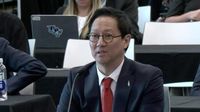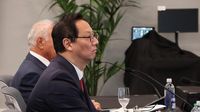In a historic and contentious decision on June 3, 2025, the Florida Board of Governors (BOG) voted 10-6 to reject Santa Ono’s nomination as the next president of the University of Florida (UF). This unprecedented move marked the first time in the board’s 20-year history that it overturned a university trustee board’s presidential selection, sending the prestigious institution’s leadership search back to square one.
Santa Ono, a seasoned academic leader and former president of the University of Michigan, had been unanimously approved by UF’s Board of Trustees just a week earlier on May 27. His proposed five-year contract included a base salary of $1.5 million, with potential earnings up to $15 million with bonuses, positioning him among the highest-paid public university presidents nationwide. Yet, despite this strong endorsement, Ono faced fierce opposition from conservative politicians and activists who criticized his past support for diversity, equity, and inclusion (DEI) initiatives and his handling of politically charged campus protests during his tenure at Michigan.
The rejection unfolded after a grueling three-hour hearing in Orlando, where Ono was subjected to intense questioning by board members, many of whom scrutinized his record on DEI, race-based admissions, climate activism, gender-affirming care, and his response to the October 7, 2023, Hamas attack in Israel. The hearing spotlighted the cultural and political battles raging in higher education, particularly in Florida, where Governor Ron DeSantis has aggressively pursued reforms to eliminate so-called "woke" policies from public institutions.
Board member Paul Renner, a former Florida House speaker and one of Ono’s most vocal critics, grilled the candidate extensively. Renner presented Ono with a binder of news clippings and public statements, challenging the timeline and sincerity of Ono’s ideological shift. Ono acknowledged his evolving views, stating that while he initially supported DEI initiatives as a means to promote fairness and equal opportunity, he later saw them as divisive and bureaucratic. He explained that at Michigan, he ultimately limited DEI offices and redirected resources toward student-focused programs like the Go Blue Guarantee, which offers free tuition to qualifying students.
Despite Ono’s efforts to distance himself from his earlier stances, skepticism remained. Renner said, "The public record completely contradicted what the nominee was telling us," underscoring doubts about Ono’s transformation. Other board members echoed concerns, with Jose Oliva, another former House speaker, describing Ono’s ideological shift as "nothing short of incredible" and questioning the scientific basis for his long-standing advocacy of DEI.
Ono also faced pointed questions regarding his handling of pro-Palestinian protests at the University of Michigan, including an encampment that lasted nearly a month on campus. Republican U.S. Senator Rick Scott accused Ono of "allowing an illegal, pro-terrorist encampment to take over the campus," putting Jewish students at risk and failing to uphold basic leadership standards. Ono defended the university’s measured approach, explaining that it aimed to avoid violence similar to incidents at the University of California, Los Angeles. He pledged that if appointed at UF, he would be vigilant in preventing antisemitism from taking root.
The hearing revealed deep divisions within the board. Some members, like Charles Lydecker, who also served on UF’s presidential search committee, criticized the process as unfair and overly adversarial. Lydecker stated, "This process does not feel fair to me," emphasizing that the interrogation-style questioning was unprecedented and perhaps inappropriate for a presidential confirmation. Mori Hosseini, chair of UF’s Board of Trustees and a staunch supporter of Ono, called the line of questioning "heartbreaking" and lamented the board’s decision to "take somebody down" amid the scrutiny.
Supporters of Ono highlighted his impressive credentials and leadership experience, noting his previous presidencies at the University of British Columbia and the University of Cincinnati, as well as his scholarly reputation. Kent Fuchs, the interim UF president who returned to the helm after Ben Sasse’s abrupt resignation last summer, endorsed Ono as "unmatched nationally in both his credentials and his experience and his track record." UF trustee Fred Ridley urged the board to "look past all the noise" and focus on what was best for the university’s future.
Nevertheless, conservative voices celebrated the decision as a victory against what they perceive as ideological overreach in academia. Anti-DEI activist Chris Rufo led much of the backlash, while elected officials such as U.S. Reps. Greg Steube, Byron Donalds, Jimmy Patronis, and former Governor Rick Scott voiced strong opposition. Scott declared on social media that the rejection was "the right decision for @UF," emphasizing that the university community "deserves a president who will stand for Florida values and against antisemitism." Donald Trump Jr. also chimed in, questioning whether the university’s decision-makers "lost their minds." Representative Jimmy Patronis tweeted, "There’s too much smoke with Santa Ono. We need a leader, not a DEI acolyte. Leave the Ann Arbor thinking in Ann Arbor."
The political nature of the confirmation process raised concerns among academics and observers who fear that state-level politics are increasingly influencing university leadership choices. James Finkelstein, a professor emeritus of public policy at George Mason University, noted that "until a contract is signed, nothing is guaranteed," highlighting the growing complexity and politicization of such appointments.
Ono’s rejection leaves UF’s presidential search in disarray. The Presidential Search Advisory Committee must now restart the process, vetting new candidates and seeking another finalist for approval by both the Board of Trustees and the Board of Governors. The timeline for this renewed search remains uncertain, though several other candidates had been interviewed before Ono emerged as the sole finalist.
The fallout extends beyond Florida. At the University of Michigan, Ono’s resignation was accepted, with no indication he could return to his former post. Faculty voices remain divided, with some defending Ono’s record and others criticizing his closure of Michigan’s DEI office. Rebekah Modrak, former chair of Michigan’s Faculty Senate, called the claim that Ono was soft on pro-Palestinian activism "absolutely untrue," but also remarked, "There’s a strong sense of justice in the fact that Santa Ono is now out of a job."
As the University of Florida grapples with this leadership vacuum, the episode underscores the fraught intersection of politics, culture wars, and higher education governance in America today. The question remains: who will step forward to lead one of the nation’s flagship public universities amid such turbulent times?



